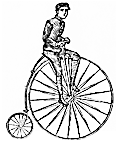
Heritage Park
Rosedale Farm
Nestled on the grounds of the 52-acre Heritage Park is the beautifully renovated Everal Barn and Homestead that provides visitors a glimpse of Westerville's past. The homestead is included on the National Register of Historic Places and is named for one of the earliest families to settle the area.
 The Everal farm, named Rosedale after J.W. Everal's rose garden, is an excellent example of nineteenth century farm architecture. Industrialist John Everal, after having discovered a large clay deposit about one-half mile from the Village of Westerville, established the J.W. Everal Tile Company in 1872. The plant was located a short distance east of the present farm on the bank of Alum Creek. The brick and tile for the farmhouse, carriage house and other outbuildings at Rosedale were fired in the Everal kiln, as were those for many Westerville area structures of the period. The plant operated nine months per year and employed thirty people, making it the largest industry in Westerville. Peak output of the plant reached 25,000 bricks per day.
The Everal farm, named Rosedale after J.W. Everal's rose garden, is an excellent example of nineteenth century farm architecture. Industrialist John Everal, after having discovered a large clay deposit about one-half mile from the Village of Westerville, established the J.W. Everal Tile Company in 1872. The plant was located a short distance east of the present farm on the bank of Alum Creek. The brick and tile for the farmhouse, carriage house and other outbuildings at Rosedale were fired in the Everal kiln, as were those for many Westerville area structures of the period. The plant operated nine months per year and employed thirty people, making it the largest industry in Westerville. Peak output of the plant reached 25,000 bricks per day.
The plant closed in the early 1900s after the clay supply ran out. However, the farm continued to operate. In 1973, the City of Westerville took an interest in the property. That year, the Historical Society applied for national historic site designation and received that recognition in 1975. In 1978, John Antrim donated his portion of interest to the City of Westerville to be used as a park. The remaining interest was purchased from Fred Miller through a federal grant administered through the Ohio Department of Natural Resources (ODNR).

Everal Barn and Homestead are a popular place for events, parties, weddings, receptions, family reunions and corporate outings.

Westerville Arts Festival is an annual 2-day juried art exhibition held at Heritage Park in July.

Heritage Park
60 North Cleveland Avenue
Westerville, OH 43081
(614) 901-6500


